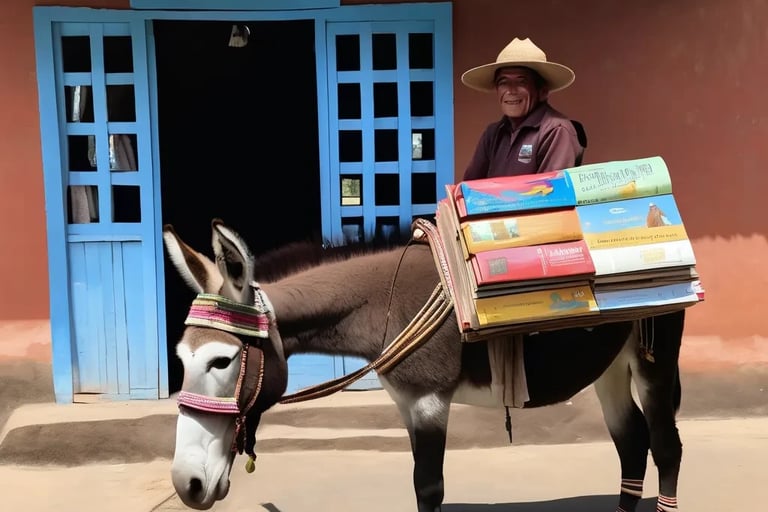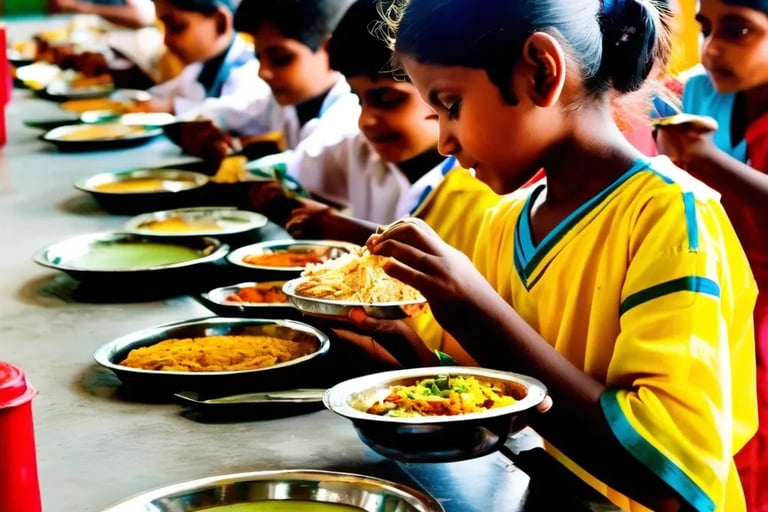Where Generosity Meets Compassion
Step into a world where small acts of kindness spark profound change, and compassion knows no boundaries. Discover inspiring examples of humanity at its finest, proving that generosity has the power to unite and uplift us all.
MINDMUSE


In today’s fast-paced, self-centric world, where the hustle for success often overshadows the essence of human connection, it’s easy to feel disconnected. The noise of daily life sometimes drowns out the quiet hum of kindness and compassion. Yet, amidst the noise, there are still pockets of beauty and kindness that quietly unfold around us—small, thoughtful actions that remind us of what truly matters. These moments of generosity and compassion shine through, offering us a glimpse of a better world, where people come together, support one another, and make life a little brighter for everyone.
As we pause and reflect, let’s take a moment to explore some of these incredible examples that not only inspire joy but also show us the power of collective care. From communities sharing their abundance to initiatives that foster connection and well-being, these stories are worth admiring and following. Let’s journey together through these acts of goodness, and perhaps find the spark of inspiration to bring a little more kindness and warmth into our own lives.
1. Germany: Share a Book, Spread a Smile
In Germany, the Public Bookshelf is a delightful concept that brings the magic of stories into everyday life where books are not just read but shared, passed along, and loved. These simple shelves, often nestled in parks or tucked into city corners, offer a place for anyone to take a book, leave a book, or simply enjoy the magic of stories without a price. It’s a gentle reminder that books, much like kindness, are best when given freely.
Each book on these shelves carries more than just words—it holds the spirit of those who’ve read it, a connection between strangers bound by a shared love of stories. When you pick up a book, you’re not just discovering a new world within its pages; you’re becoming part of a larger story—one that is passed from person to person, community to community. These books, thoughtfully left by others, carry a quiet message of generosity and trust, reflecting the simple kindness of sharing stories with those around us.
In its essence, this initiative is not just about books—it’s about building bonds, bridging gaps, and creating spaces where everyone, regardless of background or means, can find a moment of belonging. It’s a reminder that when we open our hearts to others through simple acts of sharing, we create a world where stories are not only read but felt, not only passed along but treasured.
2. Japan: Umbrellas of Kindness
In a country like Japan, where sudden rain showers are a common occurrence, being caught without an umbrella can be both inconvenient and uncomfortable. To address this, Japan thoughtfully created Ikasa, an umbrella rental service that provides a simple yet effective solution. Available at train stations, office buildings, and various public spaces, Ikasa allows people to borrow an umbrella for a small fee whenever they need one. After using it, they can return it to designated drop-off points, ensuring that others have access to umbrellas when it rains again. This system not only makes it easier for people to stay dry on their commute but also reduces the need for disposable umbrellas, promoting sustainability.
But the thoughtful approach doesn't stop there. Beyond the paid rentals, Japan also has community-driven initiatives where umbrellas are offered for free, relying entirely on trust. These programs allow people to borrow umbrellas when caught in the rain and return them when they no longer need them. It’s a simple but profound expression of generosity, reminding us that small acts of kindness can have a lasting impact on the fabric of a community.
Together, these services reflect a deeper, thoughtful approach to addressing a simple problem. They not only make life easier in moments of inconvenience but also foster a sense of mutual care and responsibility. Whether through paid rentals or free-sharing programs, Japan’s umbrella initiatives show how even the smallest acts of generosity can create a ripple of connection, building a stronger, more compassionate society. It’s a beautiful example of how a simple idea can make a big difference, both practically and emotionally.
3. France: Melodies That Unite
In France, where art and culture thrive in the most unexpected corners, public pianos have become a symbol of creativity and connection. Found in train stations, parks, and bustling streets, these instruments—marked with the phrase “À vous de jouer” (Your turn to play)—invite anyone to sit, play, and share their music with the world.
Launched with the support of local governments, cultural organizations, and companies like SNCF (the French National Railway Company), this initiative began in Paris and quickly spread across the country. It transforms everyday spaces into vibrant stages, where a passerby’s melody can turn strangers into an audience, sparking smiles, applause, or even a shared moment of harmony.
What makes these pianos extraordinary is not merely the music they produce, but the moments they create. A hesitant novice’s melody might inspire courage in another. A seasoned musician’s performance could fill a station with applause. Strangers are drawn together, bound by notes that rise above the rush of daily life.
More than instruments, these pianos symbolize the generosity of culture—a reminder that art is not confined to concert halls or elite circles. It is a gift for all, a language spoken without words, bridging divides with each note played. France’s public pianos are a testament to the quiet power of creativity to uplift and unite, turning every day into an opportunity for wonder.
The gift of giving lights every soul


Tunes that bring strangers together


Biblioburro: Bridging Worlds, One Book at a Time


Filling Plates, Fueling Ambitions. The free midday meal in India
8. Bhutan: Redefining Progress Through Happiness
In Bhutan, a small yet profoundly unique kingdom nestled in the Himalayas, a visionary approach to governance has set it apart from the rest of the world. Introduced by the Fourth King, Jigme Singye Wangchuck, in 1972, the Gross National Happiness (GNH) Index was conceived as a response to the conventional focus on GDP as the sole measure of a nation’s success. The King recognized that true progress should be gauged not just by material wealth, but by the well-being of the people, the strength of their communities, and the balance between development and environmental preservation.
The GNH Index is built upon nine key domains: psychological well-being, health, education, time use, cultural diversity, good governance, community vitality, ecological resilience, and living standards. These domains reflect a holistic view of happiness, acknowledging that emotional fulfilment, social harmony, and sustainable living are as important as economic prosperity. Bhutan measures its progress through surveys and data collected from its citizens, ensuring that happiness, in all its forms, remains at the heart of the nation’s growth.
By emphasizing happiness over material success, Bhutan offers a refreshing perspective on development. It teaches the world that genuine progress lies in creating a society where emotional and social well-being are prioritized, ensuring a future where the pursuit of happiness is both the goal and the measure of a thriving nation. The GNH Index is a testament to the wisdom that the quality of life is measured not by how much we have, but by how deeply we are content with what we hold.
9. New Zealand: Sharing Nature’s Bounty
In New Zealand, nature’s abundance and the spirit of community come together in a beautifully simple initiative—community fruit trees. Planted in public parks and along streets, these trees invite anyone to enjoy the gift of fresh, flavourful fruit. This gesture reflects a deep commitment to sustainability, ensuring that nature's bounty is shared freely among all, regardless of one’s financial situation.
Complementing this, a movement has emerged to collect surplus fruit from private gardens, redistributing it to local communities. This effort not only helps reduce food waste but also strengthens the fabric of the community by encouraging the sharing of resources. The initiative ensures that healthy, fresh food is accessible to everyone, promoting kindness, sustainability, and collective well-being.
Together, these efforts weave a narrative of abundance and care, where both nature and neighbours play a vital role in nurturing a more sustainable and compassionate world.
From the community-driven initiatives in countries across the globe, we learn a profound lesson: that simple acts of kindness and shared responsibility can have a transformative impact on society. Whether it’s the free umbrella-sharing service in Japan, the public pianos in France, or the community fruit trees in New Zealand, these gestures remind us that generosity, when woven into the fabric of daily life, creates stronger, more compassionate communities.
In India, the Free Midday Meal Scheme exemplifies this spirit of generosity on a grand scale. By ensuring that millions of children receive a nutritious meal each day, India has turned nourishment into a tool for education, breaking barriers of hunger and inequality. It’s a reminder that no child should have to choose between learning and surviving.
These global initiatives teach us that progress is not just about economic growth, but about building a world where kindness, empathy, and the well-being of others are at the centre of every action. As individuals and communities, we can each play a part—whether by sharing our resources, spreading joy, or supporting those in need. The message is clear: when we look out for one another, we create a better world for all. As we share, we grow; as we give, we uplift. Let us be inspired by the actions of others, and let these gestures light the way for a future where compassion is our greatest wealth.
Subhalakshmi Buragohain
Hyderabad
4. Canada: A Community’s Embrace in Winter
In Canada, where winters are as unforgiving as they are picturesque, a simple yet profoundly thoughtful initiative has taken root. Public trees, often in parks or near busy walkways, are adorned with scarves, hats, and gloves during the coldest months. These items, donated by community members, are free for anyone to take—providing warmth and comfort to those facing the harsh realities of winter.
The true beauty of this initiative lies in its understated elegance. Free from requirements, formalities, or judgment, it offers a humble gesture of warmth to anyone in need. For those who might shy away from more visible forms of assistance, these "winter warmth trees" provide a quiet, dignified solution. A passerby can simply take what they need, braving the cold with renewed strength, comforted by the knowledge that someone cared enough to lend a hand.
This initiative goes beyond shielding against winter’s chill—it embodies the profound strength of shared kindness. It demonstrates how even the simplest acts can weave threads of compassion, uniting a community. Warmth, after all, isn’t just what we put on; it’s what we give.
5. Netherlands: Pedalling Towards Equality and Sustainability
In the Netherlands, cycling is not just a means of transportation—it’s a way of life, deeply woven into the nation’s identity. With dedicated bike lanes sprawling across cities, parking garages built exclusively for bicycles, and a culture that embraces two wheels over four, the Dutch have perfected the art of sustainable commuting. From bustling professionals to carefree children, almost everyone pedals through the picturesque streets, rain or shine, viewing the bicycle as both a practical tool and a cherished tradition.
Amid this cycling haven, an initiative stands out for its thoughtfulness—the bike libraries. Recognizing that not everyone can afford a bicycle, these libraries lend bikes to those in need, ensuring that no one is excluded from the freedom and accessibility that cycling offers. The initiative seamlessly aligns with the Dutch values of inclusivity and sustainability, offering a lifeline to low-income residents while further promoting eco-friendly commuting.
This thoughtful concept reflects the Dutch commitment to a cleaner, fairer world. By breaking barriers to cycling, bike libraries do more than lend two wheels—they reduce carbon footprints, bridge social gaps, and uphold a collective responsibility toward both people and the planet.
6. Finland: The Baby Box Blessing
In Finland, the arrival of a baby is met with a gesture of remarkable thoughtfulness: the baby box. The humble baby box tells a story of care, equality, and a nation’s unwavering commitment to its youngest citizens. First introduced in 1938 for low-income families, this simple yet profound initiative began as an effort to reduce infant mortality and ensure every child’s right to a safe start. Over the years, it has grown to include all new parents, symbolizing a shared investment in the future, one newborn at a time. From clothes, diapers, and bedding to items promoting health and hygiene, the box is designed to ensure every baby gets a strong, healthy start in life. Ingeniously, the box itself doubles as a crib, offering a safe sleeping space for the infant. This small yet meaningful detail has played a crucial role in Finland achieving one of the lowest infant mortality rates in the world.
The baby box is not merely a bundle of necessities; it is a profound gesture of care and solidarity. It speaks to every family, regardless of their means, with the quiet assurance that their child is cherished and that help is always close at hand. This tradition paints a vision of a world where every child is welcomed with tenderness, where society wraps its youngest in compassion and hope, ensuring that the start of their life is filled with love, security, and a sense of belonging.
7. Colombia’s Biblioburro: Delivering Dreams on Donkeyback
In the rugged hills of Colombia, where remote villages are often isolated from the conveniences of modern life, a remarkable initiative has flourished to bring the gift of reading to children in the most far-flung corners. Biblioburro—the Book Delivery Burros—was founded in 1990 by Luis Soriano, a rural school teacher who recognized the scarcity of libraries in these areas. Soriano, determined to provide access to education, decided to deliver books to children by loading them onto his trusty donkeys, Alfa and Beto.
What began as a small, humble effort to bring literature to remote villages soon grew into a beloved tradition. Every week, Soriano would ride across mountains and through valleys, carrying not just books, but stories and the promise of learning. For children in these isolated villages, Biblioburro was their only bridge to a world of knowledge and imagination.
The beauty of Biblioburro lies in its simplicity. It’s a testament to how one person’s commitment can transform a community. Soriano’s personal touch made it clear that education could reach even the most forgotten places. His work has inspired many, and the tradition continues today, with the help of volunteers and local supporters. Additional donkeys and resources have expanded the program, ensuring that the legacy of Biblioburro lives on.
Luis Soriano is still actively involved in the initiative, and his unwavering dedication continues to shape the future of Biblioburro. His vision for connecting children with the power of books has touched the hearts of many, proving that with love and determination, education can find its way to the most remote corners of the world.
